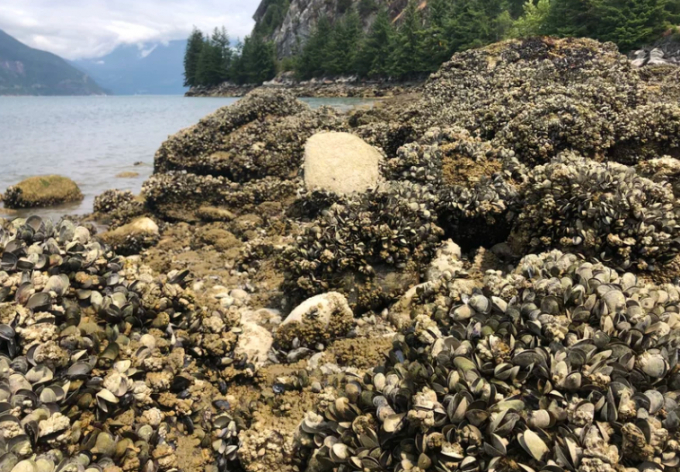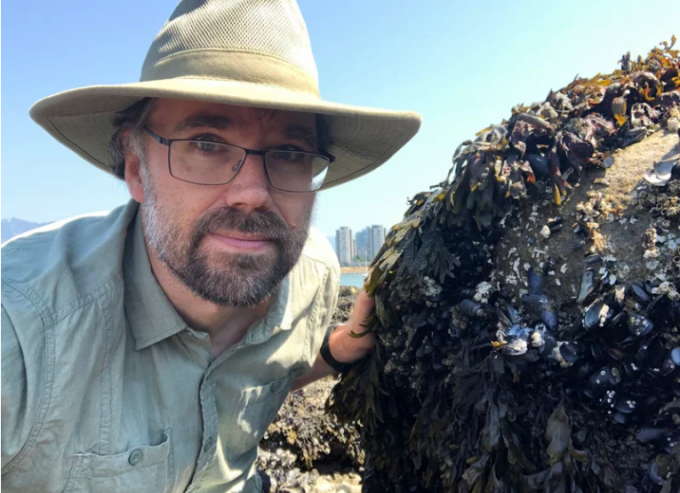June 1, 2025 | 04:07 GMT +7
June 1, 2025 | 04:07 GMT +7
Hotline: 0913.378.918
June 1, 2025 | 04:07 GMT +7
Hotline: 0913.378.918

Marine biologist Christopher Harley from the University of British Columbia says he has found hundreds of thousands of dead mussels on one beach alone. Photo: University of British Columbia
But that number is likely to be much higher, said professor Christopher Harley from the University of British Columbia.
"I've been working in the Pacific Northwest for most of the past 25 years, and I have not seen anything like this here," he said. "This is far more extensive than anything I've ever seen."
Harley reaches his estimates by counting the number of sea creatures, mostly mussels, in a section that he said is representative of an entire beach. He varies measuring some beaches that are rocky and some that are not to get a full estimate for the entire ecosystem.
"This is a preliminary estimate based on good data, but I'm honestly worried that it's a substantial underestimate," Harley told NPR from a beach in British Columbia, where he continues to survey the casualties from the most recent heat wave.
"I'm also looking for all these dead barnacles. I've been hearing from people about dead clams and crabs and intertidal anemones and sea stars. And once you really start factoring in all these different species, it's been a huge catastrophe for marine life," he said.
Though heat waves have affected marine life in the past, Harley said temperatures reaching more than 100 degrees Fahrenheit like they did last weekend in the Pacific Northwest are "exceptionally rare." But with climate change, he's seen estimates from other scientists that similar heat waves could start occurring once every five to 10 years.
"If it happens that frequently, the system won't have time to recover in between the die-offs," he said.
The die-off could have ripple effects beyond the shore
Malin Pinsky, an associate professor of marine biology at Rutgers University, said the extreme heat contributes to a "massive reorganization of ocean life."
"Species are shifting towards the poles of the Earth at about 60 kilometers [37 miles] per decade, and it doesn't happen slowly, bit by bit. It often happens in these extreme events, where a large population of something like mussels can die," Pinsky said.
But the overarching problem, marine biologists point out, is that the impact of climate change on the oceans is still treated as out of mind, out of sight. Pinsky also agrees that Harley's estimate of 1 billion creatures dead is likely an undercount.

Harley has been tracking mussels and other sea creatures in the aftermath of the heat wave that hit the Pacific Northwest. Photo: University of British Columbia
"The craziest thing is that it's just the tip of the iceberg," Pinksy said. "We can see the mussels because they're on the shoreline, but to a large extent, oceans are out of sight, out of mind, so we're likely to learn the magnitude of what's happening only much later."
That many sea creatures dying at once not only affects ocean life but terrestrial creatures as well — from birds who feed on sea life to humans running fisheries and consuming seafood.
"[Mussels] are what's known as a foundation species because a lot of the ecosystem depends upon them ... so losing the mussel bed would be losing all the apartment buildings in a city core," Harley said.
In the meantime, he's is still counting dead mussels on the seashore. On Thursday, from Porteau Cove, just north of Vancouver, he estimated 600,000 dead mussels in 164 feet of beach — a distance Harley said he can walk in a minute.
"Not every shore will be this bad, but this is a fair amount worse than I was expecting," he said.
(NPR.org)

(VAN) Vikas Rambal has quietly built a $5 billion business empire in manufacturing, property and solar, and catapulted onto the Rich List.

(VAN) Available cropland now at less than five percent, according to latest geospatial assessment from FAO and UNOSAT.

(VAN) Alt Carbon has raised $12 million in a seed round as it plans to scale its carbon dioxide removal work in the South Asian nation.

(VAN) Attempts to bring down the price of the Japanese staple have had little effect amid a cost-of-living crisis.

(VAN) Fourth most important food crop in peril as Latin America and Caribbean suffer from slow-onset climate disaster.

(VAN) Shifting market dynamics and the noise around new legislation has propelled Trouw Nutrition’s research around early life nutrition in poultry. Today, it continues to be a key area of research.

(VAN) India is concerned about its food security and the livelihoods of its farmers if more US food imports are allowed.